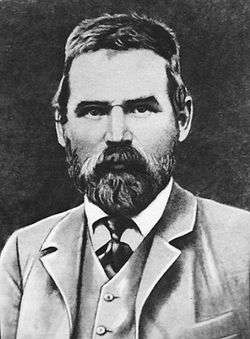Alexey Peshekhonov
Alexey Vasilyevich Peshekhonov (Russian: Алексе́й Васи́льевич Пешехо́нов) (February 2, 1867 (January 21 old style) – April 3, 1933) was a Russian economist, publicist, and statistician. He was a member of the Russian provisional government as a minister of food supplies for some months in the summer of 1917.
Alexey Vasilyevich Peshekhonov | |
|---|---|
Алексе́й Васи́льевич Пешехо́нов | |
 Aleksei Peshekhonov | |
| Personal details | |
| Born | 2 January [O.S. 21 January] 1867 Chukavino Village, Staritsky Uyezd, Tver Province, Russian Empire |
| Died | 3 April 1933 (aged 66) Riga, Latvia |
| Citizenship | Russian Empire |
Life
Peshekhonov was a self-educated social activist. Enrolled early in a Tver seminary for priests, he was expelled for political activity at age 17 (in 1884), and seems to have had no further formal training. He was strongly influenced by the narodnik philosopher N.K. Mikhailovsky. After military service 1888 to 1891, he worked first as a village teacher and later as a statistician for the Tver and Orla zemstvo councils, then the Kaluga province zemstvo administration where he became head of the statistical service (1896-1898). During this period he published noted studies on rural life that earned him entry into employment as a journalist in St. Petersburg (1899). He was also during this period several times arrested for his political activities, imprisoned or banished from his place of residence.
Around the turn of the century, in addition to his journalism, Peshekhonov became increasingly active in the left-liberal political world - i.e., he was co-founder in 1903 of a "Union for Liberation" (Soiuz osvobozhdeniia). He was also briefly a member of the Socialist-Revolutionary Party but objected to its use of terror. In 1906, he co-founded, with N.F. Annensky, V.A. Miakotin and others, the Popular Socialist Party (NSP). After the "Bloody Sunday" events of January 1905, he was locked up in the Peter and Paul Fortress, then banished until October of that year, and again arrested for several months in 1906. During the following years, Peshekhonov published several books on agrarian, economic and political issues.
In February 1917 Peshekhonov assumed leading roles as an NS delegate in the Petrograd Soviet of Worker's and Soldier's Deputies, with strong engagement on agrarian issues. He favoured co-operation of the Soviet with the (Kadet) Provisional Government, and in May 1917 joined the coalition government then formed as minister of food supplies. In October, he was deputy chairman of the pre-parliament council, and after the Bolshevik seizure of power joined the left-center opposition. In 1921 he played a leading role in organising famine relief for Russia.
In the fall of 1922, Peshekhonov was included in the list of intellectuals to be exiled abroad by a Central Committee decree (although he does not seem to have travelled on the famous "Philosophers' ships" that took the bulk of them to Germany). Exiled against his will, more left-wing than most of his co-expellees, Peshekhonov unhappily pursued his economic and political studies in Berlin and Prague, but repeatedly applied for permission to return to the Soviet Union. This was never granted, but eventually he was given a post as a consultant to the Soviet Trade Mission in Riga, where he died in 1933. His remains were permitted to return and buried in Leningrad.
References
- Biography (in Russian)
- Biography (in Russian)
- Biography (in Russian)
- Biographical entry (Russian Wikipedia)
- Lesley Chamberlain, The Philosophy Steamer: Lenin and the Exile of the Intelligentsia, London: Atlantic Books, 2006, passim.